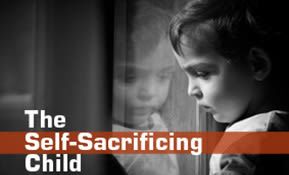
Kids ‘R Us
Let's be honest and take stock in ourselves. Don't shy away from it or get scared by what you might discover. Everything is reversible, everything is fixable...

What’s a leader? Someone who’s inspired. They have a vision, and they believe in it. They have values, and they really believe in them. They’re living their values -and when you’re around people like that, it’s very inspiring.
Parents are leaders of their families. It’s our job to inspire our kids, which means accepting a higher standard of behavior for ourselves. A parent has to accept the responsibility for the ‘family outcomes’ – it’s primarily their responsibility, not their kids. Kids are just kids. We have to educate our kids about Torah and eternal truths. That means asking ourselves some very frank questions: can I really educate my children properly, if I don’t really believe in what I’m teaching and telling them, myself?
If the answer is ‘no’, don’t despair. Rav Arush teaches us to believe in belief. Believe in the belief that one day, you too will have emuna,  and set that as your goal. Tell G-d that you want to believe in the world-to-come; in a loving G-d; that the world is simply a mirror, giving me the cues I need to fix and improve myself.
and set that as your goal. Tell G-d that you want to believe in the world-to-come; in a loving G-d; that the world is simply a mirror, giving me the cues I need to fix and improve myself.
Go for it! Little by little, day by day, it gets there.
Say you’re a parent with a disrespectful, disruptive child. A child who’s acting out, and child who’s going off the path, G-d forbid. The normal, natural initial response for a parent is to ask themselves: what’s going on here? Why is this good? But then, we can take it up a level: Why is this happening? What’s the message? How can I relate to this in a productive way?
Here’s one possible idea: Kids are the purest beings on the planet. (We were that way too, when we were kids.) All kids have the intention, deep down, to be helpful to their parents. If that kid is misbehaving, acting out, off the derech, in a certain sense, it means they’ve taken control of the family. It’s unhealthy, yes, but kids need connection, attention, parents.
If the parents are struggling; if the family unit is breaking apart; that kid doesn’t want to have a divorce in the family, G-d forbid. If the only way he can keep his family intact is by creating an emergency situation, or ‘shock’, then that’s what he’s going to do.
I’ve never seen a divorce in a family where a kid was suicidal, anorexic, or self-mutilating.
The kid isn’t doing it just to fight, or to be difficult. That child really wants to be part of your family unit and your values. Another point to make here, is that if a parent wants their kids to have values that they themselves don’t have, then their children don’t have the ‘blueprint’ or map they need, to follow, to get to where the parent is aspiring for them to go.
So we have to start with ourselves, and we have to try and inspire our children with our own behavior. Especially if we have a ‘difficult’ kid, we have to say to ourselves that no matter what, I am going to give him what he needs, when he needs it. No matter what, I am going to drop everything to do that.
When the parent makes that decision and stands behind it, even when it requires a lot of parental mesirut nefesh, or self-sacrifice, that creates the right environment to motivate our children. The difference between kids who have direction and those that don’t, is that for the first group, the parents are making decisions, and know where they want their families to get to.
Our Kids Are Us
Let’s be honest, and take stock in ourselves. Don’t shy away from it, or get scared about what you might discover. Everything is reversible, everything is fixable. G-d is beyond science and stats. Put the past behind you, and go for it! You can change things right now, and get them moving in the direction you really want your family to be heading towards.
Kids are young and impressionable. You can start influencing them right now, even if they aren’t cooperating with you. How? It’s very simple: just act the way you want them to act. They’ll watch you and listen to you, and eventually, they’ll follow you. Why? Because they don’t want to lose their grounding, and you, their parent, are the earth on which your kids stand.
It’s a basic human need that all people have, to be given love and attention. If your kid can’t get that from you in a healthy way, he’s going to find another way to do it. That ‘other way’ might not be pleasant, but accept it, and work with it. Once we accept that pain with love, we can transform our relationship with ourselves, and with others.
RECAP:
1) Kids need attention.
2) Kids are serving a protective function in the family. Kids really mean well, even when they have to get soul sick to make that point. The only reason they are being rebellious and disruptive is because they feel that they have no significance to you, their parent.
Once that kid gets sick or ‘soul sick’, they are empowered. Maybe for the first time ever, they feel significant. It’s not easy, but if that’s where you’re holding, accept it.
Think back to when you were little. When we were kids, we also acted up, at least occasionally, to get negative attention. We can all relate to this idea.
So now, think about how in your family is the most disruptive person? Who is causing the most difficulties and pain? Who is Hashem using as His messenger to wake you up, and to encourage you to make some much-needed changes?
Then ask yourself some other questions:
* Are you willing to take a more proactive role?
* Are you willing to invest a greater amount of unconditional love into your family, and particularly, that ‘difficult’ child, even if they aren’t receptive?
* What lengths are you willing to go to to convince that child that you want a real connection and bond with them?
* Are you willing to close the gap after years or not making any real effort to do so?
* Are you ready and willing to do this? Are you ready and willing to reinvigorate this relationship, and to put effort in, no holds barred, to make it how you really want it to be, and to re-connect?
* Practically, what will it take to achieve that?
* What is your model of love? Do you depend on getting the love of others? If you don’t get it for a day, an hour, a minute, do you start to question your own love-ability?
* Can your love for another person stand on its own, even if it’s not reciprocated?
* Is your love competitive? Is it limited? Is there any feelings of rivalry? Do you want to stop other people from getting the love that you think should all be for you?
* What would be a healthier and more balanced type of relationship and love for you?
* Do you need to re-examine your work ethic, and work / life balance?
* If you made this commitment to give more to a particular person, what would the effect be on you; them; the rest of your family?
* What would change if you could give more, or be more accepting?







Tell us what you think!
Thank you for your comment!
It will be published after approval by the Editor.